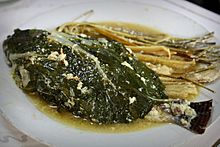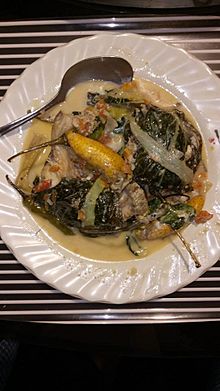Sinanglay facts for kids
 
|
|
| Alternative names | sinanglay na isda, picadillo (pikadilyo) |
|---|---|
| Course | Main course |
| Place of origin | Philippines |
| Region or state | Bicol Region |
| Serving temperature | Hot |
| Main ingredients | fish, coconut milk, pechay/mustard/taro/cabbage leaves, tomatoes, shallots, pandan leaves or lemongrass |
| Similar dishes | ginataang isda, pinaputok na isda, laing |
Sinanglay is a yummy Filipino dish. It's made with fish that is stuffed and then wrapped in leafy greens. These are cooked in a tasty, spicy coconut milk sauce. Sometimes, lemongrass or pandan leaves are used for wrapping too. This dish comes from the Bicol Region in the Philippines. It's a type of ginataan, which means it's cooked with coconut milk.
What is Sinanglay?
Sinanglay is a special dish where fish is filled with a mix of yummy ingredients. This stuffing usually includes onions, scallions, garlic, tomatoes, and a mild chili called siling haba.
How is it Made?
After stuffing, the fish is carefully wrapped in large leafy vegetables. Common choices are pechay, mustard greens, taro leaves, or cabbage. These wraps are then tied securely with strips of pandan leaves or lemongrass.
The wrapped fish is then cooked in a rich sauce. This sauce is made from coconut milk or coconut cream. It gets its flavor from ginger (or turmeric), black pepper, and a savory sauce like patis (fish sauce) or bagoong alamang (shrimp paste). A little salt and spicy labuyo chilis are also added. To give it a tangy taste, a souring agent is used, like tamarind, calamansi, or bilimbi.
The dish simmers for about 10 to 20 minutes. It's stirred gently so the coconut milk stays smooth. Sometimes, prawns or shrimp are added to make the flavor even better. Sinanglay is usually eaten hot with white rice.
Different Kinds of Fish Used
The most common fish used for Sinanglay is tilapia. However, many other types of fish can be used too! This makes the dish very versatile.
Popular Fish Choices
Some other popular fish for Sinanglay include:
- Talusog (snakehead)
- Hito (walking catfish)
- Karpa (carp)
- Puyo (climbing perch)
- Maya-maya (red snapper)
- Hasa-hasa (short mackerel)
- Pampano (pompano)
These different fish give Sinanglay a slightly different taste and texture each time.

